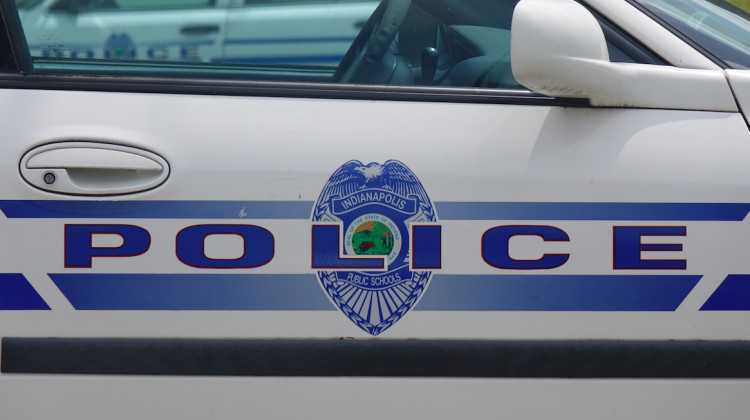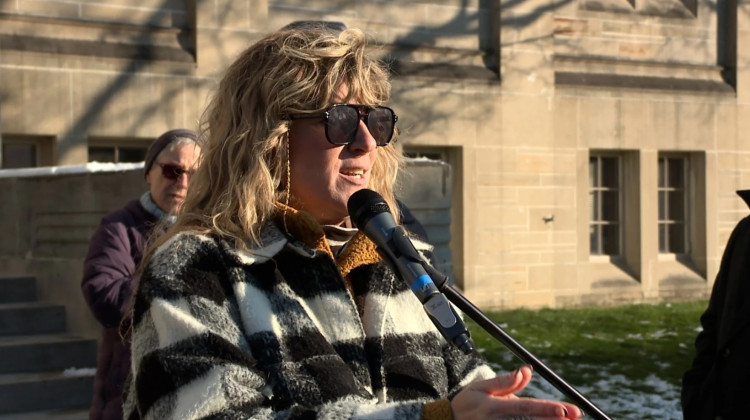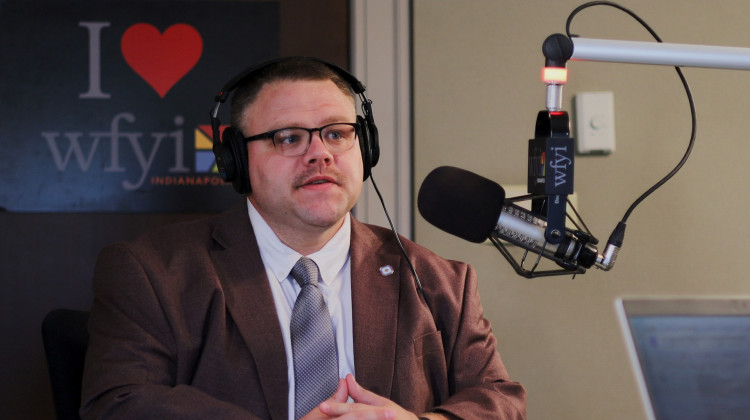In 2016 Indianapolis Public Schools leaders announced a review of its police force, a process intended to improve accountability and data tracking for the state’s largest school district-based law enforcement agency.
But more than four years later, as racial justice protests continue and activists call for “defunding” police, an IPS district official says the review was not completed.
In the past week, school boards in Chicago, Los Angeles, and other cities considered whether to cut school police force budgets or end partnerships with local police departments. Minneapolis Public Schools just severed ties with its city’s police department in response to the death of George Floyd while he was held down by an officer.
The conversation has not come to Indianapolis in the same way.
When asked about the role of law enforcement in schools at a recent virtual district forum, IPS Superintendent Allesia Johnson said a review of the district police force was forthcoming. Thursday IPS Board of Commissioner Venita Moore said the district should not employ any officer with an excessive force record or discrimination complaint.
“We want the same for all our students, but it makes me angry when I know that Black IPS students -- who are most of our students -- face discrimination, racism and structural barriers in our society that may forever hold them back,” Moore said in a statement.
In 2016 researchers at Indiana University’s Public Policy Institute released an analysis of the Indianapolis Public Schools Police Department (IPSPD) based on data provided by the district. The review was part of former Superintendent Lewis Ferebee’s strategic plan. It did not examine the role of the Indianapolis Metropolitan Police Department (IMPD), which supports IPSPD under a memorandum of understanding on jurisdiction and investigations.
READ: Review of IPS Police Department Operations and Activities
The researchers concluded IPSPD officers appeared to be “dedicated, skilled public servants” and the department built on a “strong framework of operations,” but it also raised concerns about transparency for officer discipline and inconsistent reporting on officers' daily interactions with students, an issue that makes it difficult to evaluate initiatives.
The researchers laid out a set of recommendations and said the district should create a citizens review panel to oversee complaints of officers and internal investigations. They also suggested the district survey students, teachers and others about their perceptions of police in schools.
Following the release of the IU report in March 2016, a now former district executive announced the administration would be “exploring the feasibility of the recommendations … to ensure our school communities are safe.”
Now, IPS Chief of External Affairs Ahmed Young said that did not happen.
Young cites school board elections, turnover in the administration, Ferebee’s departure in December 2018 and last year’s retirement of the former police chief as reasons the review was not completed.
But Young said the police department has undergone some changes that were not connected to the review.
The district’s use of force policy was reviewed in April 2017. Last week, the school board approved a resolution that says it continues initiatives that began in 2015 to “reduce the number of officers in schools” and “auditing all practices to identify and reduce racial disparities."
Young said Police Chief Tonia Guynn has continued to review and continually alter department protocols. He said more changes will be considered as the district makes racial equity the focus for all aspects of the district.
“We've had some conversations about how can we do things better, you know, how can we dig into our data and reflect on our current practices,” Young said. “Where are the gaps and where are the things that we're doing well, and what are those opportunities for improvement?”
Guynn has worked for the IPS police department for more than 30 years, starting as a police dispatcher. She says the goal of the force is to be a “support system” that is more than just policing.
“In terms of not only to protect and serve in the policing matter, but more along the lines of school resource officers, which take a role with lowering suspensions by mentoring, fostering relationships with students, family, staff,” she said.
The IPS Police Force
Young says IPSPD officers, also known as SROs (school resource officers), in recent years, have centered on de-escalation and mentoring.
Data provided by the district shows the number of officers in schools shrank in the past five years, during which time the IPSPD budget remained relatively stable.
Arrests of students by the IPS police fell by 68 percent in the same time period, from 238 students in 2014-15 school year, to 76 students during the 2018-19 school year, according to the district. IPS reports 50 students were arrested during the recent school year, when school buildings were closed in March due to the coronavirus.
Guynn currently oversees 41 officers and sergeants, and 10 civilian staff. In 2015, there were 56 officers and sergeants and 13 civilian staff.
Some officers and sergeants are assigned to middle and high schools. Other officers patrol in shifts and respond to needs at elementary schools, home welfare checks and student transportation.
The current budget for the department is $4.6 million. In 2014, the budget was $4.49 million, a 2 percent decrease from 2013 and an 8 percent decrease since 2011, according to the IU report.
Guynn says the present moment of protest for racial justice presents an opportunity for the department to improve its interactions with students.
“To continue what we're already doing in terms of seeking out training that can always sharpen skills and teach different things,” she said.
The IU Study
The 37-page report, "Review of IPS Police Department Operations and Activities," analyzes data from 2013-2015, including age of officers, type of incidents, arrests and use of force reports.
Researchers concluded IPSPD followed best practices for school policing. But it also warned, the analysis “was not comprehensive in nature and provides only a broad overview of current IPSPD administration and activities.”
Eight recommendations were made by the researchers, including the development of a civilian oversight board to review complaints about officer behavior.
“While it is true that the IPSPD is a relatively small police force with limited jurisdiction and working primarily within IPS school facilities, it is reasonable to anticipate an average number of annual complaints against IPS officers that will require investigation,” the report reads. “In such cases, it may be beneficial for the IPSPD to explore options for conducting independent investigations and allowing for some level of civilian oversight of these investigations.”
Other recommendations include:
- Survey IPSPD officers, school administrators and teachers, students, and parents about perceptions of IPS police officers
- Develop a “more systematic approach to records management/data collection and data accessibility.”
- Perform a comprehensive department review
Young says district leaders are informally discussing asking IU’s Public Policy Institute to complete another review.
Responding To The Moment
Protests in Indianapolis, sparked by the death of George Floyd in Minneapolis last month, have focused on reforms to the local police department and police union. Mayor Joe Hogsett and IMPD Chief Randal Taylor responded, in part, and pledged to make some changes.
Throughout weeks of protests, the Indianapolis schools police department appeared to be spared from scrutiny. Though IPS school officials and board commissioners acknowledge the moment calls for reflection of how police interact with students.
Young said IPS is in a much different position than Minneapolis Schools, which voted to cut ties with its city police force, because the district does not pay for IMPD services and operates its own police force.
“But at the same time, we have to be conscientious of the fact that they are the preeminent law enforcement body, as it currently stands, within the city,” he said of IMPD. “And we navigate that as thoughtfully and critically as possible, particularly given the protests and the movement taking place throughout the country now.”
Sheldon Greenberg, a Johns Hopkins University professor who studies policing, said it's expected cities and school districts will want to respond immediately to calls for change in policing -- but he urges caution.
“So much of the discussion now is not based on strong information, but rather emotion of the time, understandably,” he said. “But we shouldn't be making major decisions based on that.”
Greenberg warns against the concept of “the police” as a monolith -- all officers and departments are interchangeable. Rather, he says, there are no nationwide standards or objectives for hiring, training, performance, certification or integrity. That lies with local control, such as the school board.
Greenberg said before a school board begins to make changes it needs to be secure in its objectives. Namely, why are police in the school to begin with?
He said officials must take into account the “school-to-prison pipeline” which adversely affects minority and marginalized students and students with disabilities. A recent Chalkbeat Indiana analysis showed school police are 2.5 times as likely to arrest Black Indiana students than white students.
“(The school board) should be putting forth an agenda that deals with the range of issues that need to be discussed,” he said. “I'm first in line to say there are some schools that should not have SROs”.
There’s a range of questions to consider, Greenberg said, such as: What was the reason for placing an SRO in a school? Who selected them to be at the school? Were school staff and educators involved in the selection? How were the SROs trained?
Additionally, he said, officers must be oriented to policing in a specific school culture, not just in a city or the broader school district, to be successful.
“There’s a lot that needs to be learned and really understood to have a good, sound discussion about what we do next,” he said. “What we do with what we have, and how we can get more out of the school resource officers we have.”
Contact WFYI education reporter Eric Weddle at eweddle@wfyi.org or call (317) 614-0470. Follow on Twitter: @ericweddle.
 DONATE
DONATE







 View More Articles
View More Articles

 Support WFYI. We can't do it without you.
Support WFYI. We can't do it without you.